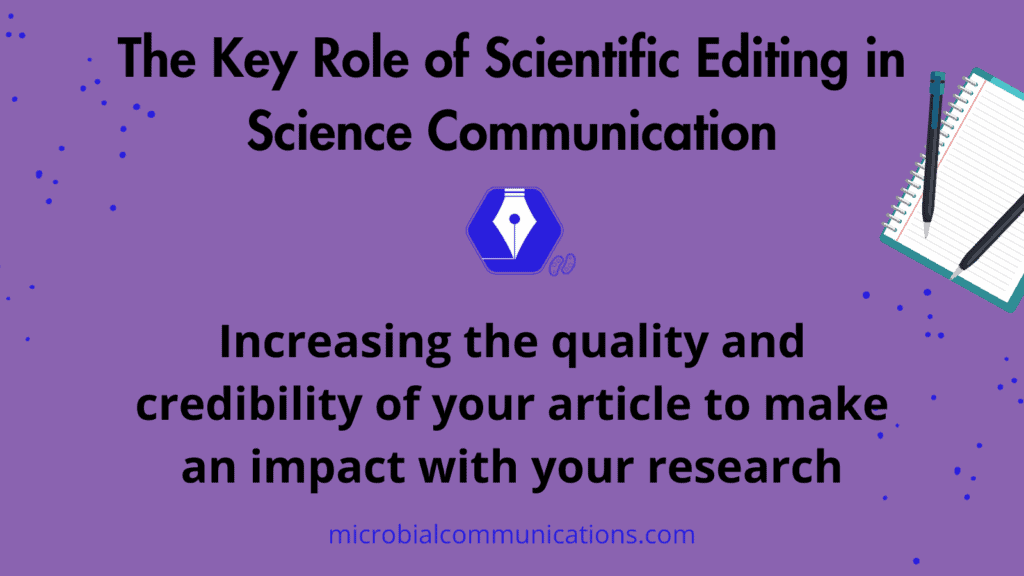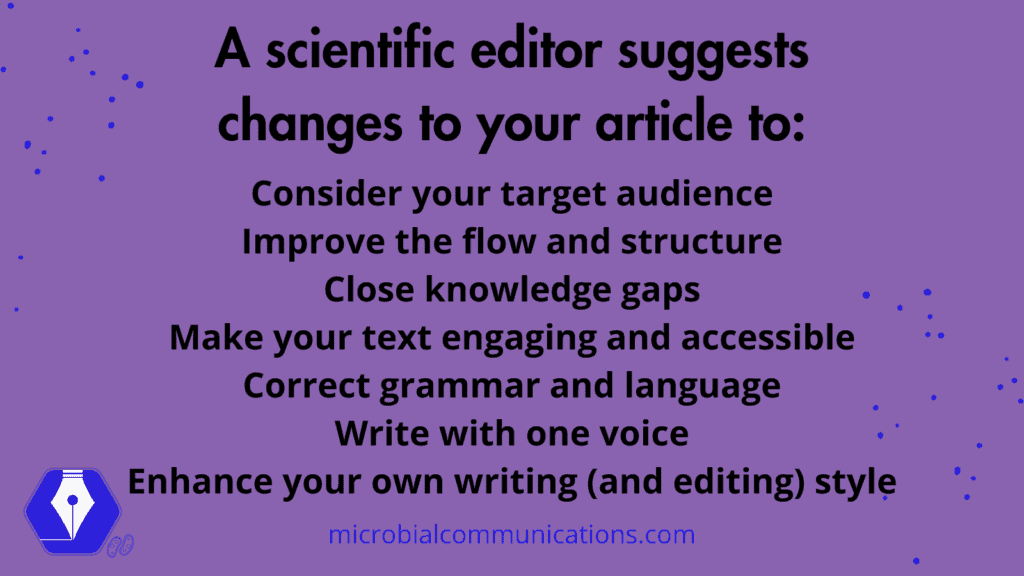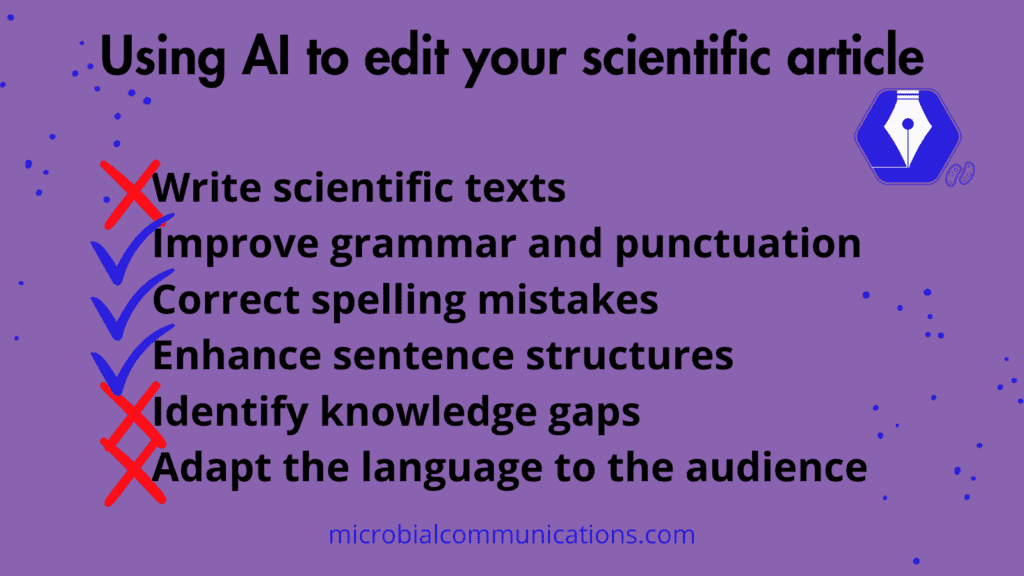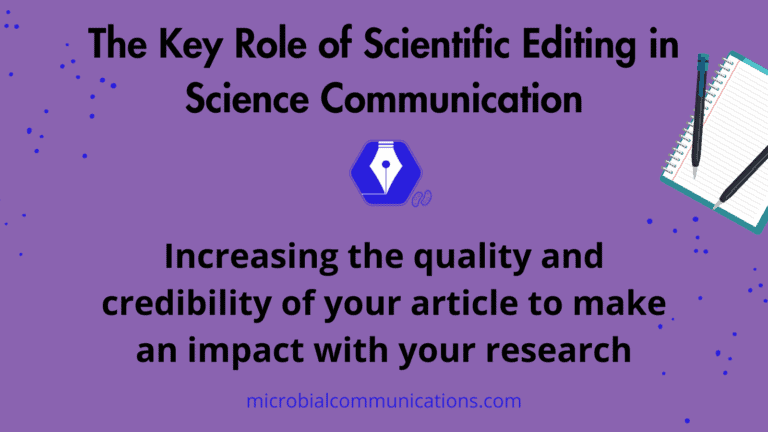As a science writer and editor, I come across many texts written by scientists about their research. These can be their newest research paper, a literature review, white paper, blog or social media post.
Writing about your research is one of the most effective ways to communicate science with your audience, as well as promote and advance science. But to achieve this, scientists need to transform the conceptual knowledge that they have in their brains into the written word on paper.
For some scientists, this seems rather challenging. Many write about a scientific concept by simply pouring out the knowledge in their heads. And when reading their text, it may make sense to them.
However, when it comes to the reader – the so-called audience – this is probably not the case. The scientist would argue that everything is indeed written down. However, a reader unfamiliar with the scientific field may not be able to follow the text or understand its key message and the underlying concept.
Another scenario is when many scientists agree to write an article together – I see this happening often for literature reviews or in scientific panels. Each author adds a few paragraphs here and there, a new definition for a term in their way or another reference. These additions often decrease the flow of the text, introduce one term with several definitions or even use different terms for the same concept.
Why scientific editing is important
As you may have guessed, both these situations warrant thoughtful and meticulous editing to improve the article and make its key message clear. This means that someone needs to go through the text, making sure it speaks to the audience, uses scientific jargon minimally and explains the jargon and scientific concepts coherently.
As scientists, we are trained to edit our written articles ourselves or have a colleague or mentor proofread them. However, many find it difficult to edit their writing. And scientists from the same niche often are so deep in the topic that they do not see the logical gaps that the text has. They do not stumble across the used jargon since they know what the terms mean.

This is when a science editor can help you produce a scientific article that speaks to your audience and explains your science coherently and in an engaging voice. Only profound and professional scientific editing will enhance the clarity of your text, cut ambiguity and efficiently communicate your research impact.
As such, a science editor will save you a lot of time, energy and frustration while improving your communication project. I am sure, you can use that time and energy for your research.
What a scientific editor does
Generally, a science editor will help you adapt your scientific text to the required output format and audience while ensuring the content is logical, clear and engaging. Let’s look at each task in more detail to learn about what exactly a scientific editor does.
Consider your target audience
To me, it often seems to be the most difficult for scientists: think about who is going to read your article. What kind of background knowledge and understanding of your scientific concepts do they have?
A scientific editor will point out the terms, jargon and technical phrases that may not be well-known to your audience. Together, you can find engaging ways to explain those terms, weaving in descriptions and definitions. This will ensure that the text resonates with the reader’s background and level of understanding.
Improve the flow and structure
Many scientists tend to write articles by describing the series of experiments they did and how they got their results. This makes sense when talking to a scientific audience from your field. They know which experiment gives you which type of results and how to interpret them.
However, for a non-scientific audience, this is not the case. They barely understand the scientific concept, let alone the molecular background of your experiments. Hence, you would need to find an engaging story for your article and a coherent and logical flow to connect all your data points.
To achieve this, a science editor can help you organise your content in a structured manner to create your story. This will ensure that the information flows smoothly, helping readers grasp the scientific concept without getting lost in the details.
Close knowledge gaps
Similar to the two previous points, many articles written by scientists often have knowledge gaps. These are parts of the story where the author jumps from one point to the next without explaining how to get there. As an expert in your field, you may not see those gaps anymore as everything makes sense to you.
Yet, your reader may not have all that background knowledge. They need you to lead them through your story from one point to the next.
A scientific editor will be able to highlight those gaps that need further explanation and point out inconsistencies. This will make sure that your reader can follow your train of thought and get your message.
In case you do not have the financial means to hire a professional editor, friends or peers from different fields may be able to help you. They can point out areas they did not fully understand or where they were unable to follow the story. But then you still need to modify the text yourself, while a scientific editor could support you with that task.
Make your text engaging and accessible
Another myth that seems to hold in the academic field is that scientific writing is dry and boring. However, I think, a scientific article should convey the same passion and sense of awe that you have for your research topic.
Yes, I know, it can be tricky to weave that into your text and create an exciting and colourful scientific story. Gladly, a science editor will find ways to enhance your text by improving the writing style and adding anecdotes or real-life examples to captivate your reader.
On another note, many scientific articles contain sentences of more than 30 words. I’ve seen drafts for blog posts containing paragraphs of four or five lines consisting of one sentence. Who is going to remember the beginning of the sentence when reaching the end? No one!
A scientific editor will chop these hyper-long sentences into three or four. This will enhance the readability and accessibility of your text to help your reader follow the story.
Correct grammar and language
As we know, most scientific literature is written in English. And the English language can be tricky to handle in the sense of grammar and spelling. Since only a few scientists have English as their native language, this can be a huge obstacle.
Here, a scientific editor will be able to support you and correct the grammar, punctuation and spelling errors in your text. This will ensure your text sounds more professional, increasing its credibility and preventing misunderstandings.
Write with one voice
As in the example from the beginning, you may have written an article with several other authors. Now, the final draft contains a mixture of writing styles and definitions, repetitions of phrases and statements and gaps in the flow due to deletions or additions.
Such a draft needs profound editing to clean up the text and make it consistent. A scientific editor will ensure to use one voice and the same terms and phrases across the whole article. Plus, they will help you fill in the knowledge gaps and improve the flow of the text.
Enhance your writing (and editing) style
If you are just starting in the scientific field and are writing your first article, you may find yourself struggling with the writing process. Writing scientific articles is probably distinct from what you have learned before entering academia. Unfortunately, you have a pretty steep learning curve ahead; but trust me, you can do it!
To improve your writing skills, you can get a science editor or science writer to help you. Let them edit your text and learn from the improvements to understand what good writing is. By copying their style, you will develop your writing skills.
So, I want to encourage you to keep penning those drafts and trying to explain your research to different types of audiences. When it comes to writing, practice makes perfect. Copy the writing tricks from a professional editor and your writing will get better. And the better your initial draft, the less editing will be needed later.

Using AI for scientific editing
Now that we’ve seen how a scientific editor can support you in improving your articles, you may ask whether to use AI for the scientific editing process. While this topic warrants a whole article, I want to comment on it at least briefly here.
I and others have seen that AI software is not very reliable when it comes to writing scientific texts. Their algorithms may lack data to write a comprehensive and detailed story which may lead them to make up fake data and citations.
This cannot be accepted for writing scientific articles!
However, AI software may be of help for the editing process of your scientific article. Free online grammar and spell checkers, such as Grammarly or Hemmingway Editor, can catch basic errors. They allow you to improve the grammar, punctuation and spelling errors. And to some extent, they can also suggest how to improve sentence structures or the readability of your text.
Yet, they fail to see the big picture and the overall flow of your article. They do not identify knowledge gaps or adopt the language, jargon or scientific descriptions to a particular audience.
So, these tools can help you with the basic editing process. Yet, I suggest that an expert scientific editor goes through your text to make sure your content flows and is coherent and attractive to your target audience.

Hiring a scientific editor to improve your article
As you and I know, writing scientific articles is not easy. That’s why getting support to improve the clarity, flow and style is crucial for any article.
Sure, you can try to edit the article yourself or ask colleagues or friends to help you. But they will not have the same expertise as a professional science editor. Instead, a science editor will ensure that your article is clear, accurate, engaging and tailored to the readers’ level of understanding.
This will enhance the quality and credibility of your article, and ultimately its impact. Only with a professional and impactful article, you can clearly communicate scientific knowledge to advance science and elevate the scientific discourse. In my opinion, this is the reason why editors are indispensable for science communication and the scientific community.

